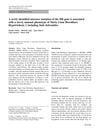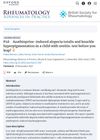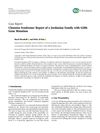 7 citations,
June 2016 in “Bone Research”
7 citations,
June 2016 in “Bone Research” A Chinese family had a child with a specific gene mutation causing vitamin D-resistant rickets, but the child improved with calcium and low-dose calcitriol.
 7 citations,
April 2013 in “Clinical and Experimental Dermatology”
7 citations,
April 2013 in “Clinical and Experimental Dermatology” Tianeptine, an antidepressant, may prevent stress-induced hair loss in mice.
 6 citations,
May 2012 in “Archives of Dermatological Research”
6 citations,
May 2012 in “Archives of Dermatological Research” A new mutation in the HR gene is linked to a rare form of hair loss with limb deformities.
5 citations,
July 2017 in “International journal of endocrinology and metabolism/International journal of endocrinology and metabolism.” Two siblings with a genetic mutation had a form of rickets that doesn't respond to vitamin D.
4 citations,
December 2021 in “Journal of clinical laboratory analysis” A new mutation in the DCAF17 gene was found to cause Woodhouse-Sakati syndrome in a large family.
 4 citations,
August 2013 in “Case reports in dermatology”
4 citations,
August 2013 in “Case reports in dermatology” A patient with total hair loss developed vitiligo after using a treatment called DCP.
 3 citations,
December 2021 in “Frontiers in endocrinology”
3 citations,
December 2021 in “Frontiers in endocrinology” A new mutation in the DCAF17 gene was found in a Chinese family, causing Woodhouse-Sakati syndrome and diabetes.
 3 citations,
April 2016 in “Journal of Investigative Dermatology”
3 citations,
April 2016 in “Journal of Investigative Dermatology” Tofacitinib, a JAK inhibitor, improved hair regrowth in most patients with severe alopecia areata and had minimal side effects.
 2 citations,
April 2018 in “Journal of Investigative Dermatology”
2 citations,
April 2018 in “Journal of Investigative Dermatology” Intralesional chemotherapy with 5-fluorouracil and methotrexate may worsen keratoacanthoma-type skin cancer in transplant patients.
1 citations,
September 2021 in “Frontiers in genetics” A genetic mutation in the DCAF17 gene caused Woodhouse-Sakati syndrome in a Chinese patient from a related family.
 1 citations,
January 2023 in “Cutis”
1 citations,
January 2023 in “Cutis” The paper concludes that the new medication baricitinib needs further testing in a more diverse group of patients with alopecia areata.
 November 2024 in “Rheumatology Advances in Practice”
November 2024 in “Rheumatology Advances in Practice” Monitor for early signs of azathioprine toxicity and check blood counts regularly.
 June 2024 in “Skin Research and Technology”
June 2024 in “Skin Research and Technology” hsa-miR-193a-5p may help diagnose and treat alopecia areata.
 March 2024 in “Skin research and technology”
March 2024 in “Skin research and technology” High CRP levels could indicate vitamin D deficiency in people with alopecia areata.
 January 2024 in “Authorea (Authorea)”
January 2024 in “Authorea (Authorea)” STK11 gene polymorphism does not predict metformin response in PCOS.
 January 2024 in “Clinical, cosmetic and investigational dermatology”
January 2024 in “Clinical, cosmetic and investigational dermatology” A child with a rare vitamin D-resistant condition improved with treatment.
 October 2023 in “Case reports in dermatological medicine”
October 2023 in “Case reports in dermatological medicine” A Jordanian family with Clouston syndrome has a common GJB6 gene mutation.
 September 2023 in “Journal of the American Academy of Dermatology”
September 2023 in “Journal of the American Academy of Dermatology” Children with alopecia areata, especially with Down syndrome or thyroid issues, should be screened for thyroid disease.
May 2023 in “International journal of molecular sciences” The ABCA4 gene protects hair follicle stem cells from toxic vitamin A byproducts.
 April 2023 in “Medizinische Genetik”
April 2023 in “Medizinische Genetik” New gene discoveries have improved diagnosis and treatment for skin and hair disorders, but more research is needed to fully understand them.
 December 2022 in “Curēus”
December 2022 in “Curēus” Genetic testing confirmed a young girl has Atrichia with Papular Lesions due to mutations in the hairless gene.
November 2022 in “Frontiers in pediatrics” A girl with skin rashes and low zinc levels improved with zinc supplements and had new gene mutations linked to her condition.
 November 2020 in “International journal of contemporary pediatrics”
November 2020 in “International journal of contemporary pediatrics” Two siblings had a rare immune disorder caused by a FOXN1 gene mutation.
April 2019 in “The journal of investigative dermatology/Journal of investigative dermatology” A compromised gut may trigger the autoimmune hair loss condition Alopecia Areata.
Certain KIR genes in Indian SLE patients are linked to disease severity and could be biomarkers.
January 2018 in “Elsevier eBooks” Progeria, a disease that causes early aging, is linked to a gene mutation and helps us understand normal aging.
 January 2017 in “Jikken doubutsu ihou/Jikken doubutsu/Experimental animals/Jikken Dobutsu”
January 2017 in “Jikken doubutsu ihou/Jikken doubutsu/Experimental animals/Jikken Dobutsu” Mice with a changed Hr gene lose and regrow hair due to changes in the gene's activity.
 February 2013 in “Journal of the American Academy of Dermatology”
February 2013 in “Journal of the American Academy of Dermatology” Certain gene variations may increase the risk of alopecia, and platelet-rich plasma treatment can improve hair density in those with hair loss; a rare case of facial Becker's nevus was linked to uneven beard growth.
 October 2024 in “Journal of the Endocrine Society”
October 2024 in “Journal of the Endocrine Society” Certain genetic variants reduce enzyme activity, contributing to non-classic congenital adrenal hyperplasia.
 October 2024 in “Journal of the Endocrine Society”
October 2024 in “Journal of the Endocrine Society” Certain genetic variants impair enzyme activity, contributing to non-classic congenital adrenal hyperplasia.





















